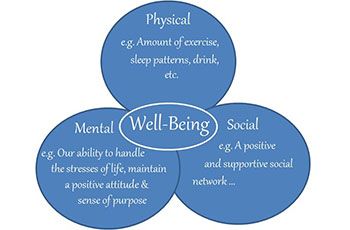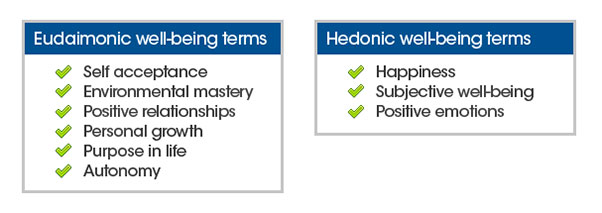
Psychological Well Being
Health, as defined by the World Health Organization (WHO), is "a state of complete physical, social and psychological well-being and not merely the absence of disease or infirmity." Mental health may be defined as the ability to adapt and manage physical, mental and social challenges throughout life resulting in a state of wellbeing.
The Six-factor Model of Psychological Well-being [PWB] is a theory developed by Carol Ryff which determines six factors which contribute to an individual's psychological well-being, contentment, and happiness. Psychological well-being consists of positive relationships with others, personal mastery, autonomy, a feeling of purpose and meaning in life, and personal growth and development. Psychological well-being is attained by achieving a state of balance affected by both challenging and rewarding life events.
Six factors are considered key-elements of psychological well-being as measured on a scale:
-
Self-acceptance High scores reflect the respondent's positive attitude about his or her self. An example statement for this criterion is "I like most aspects of my personality"
-
Personal growth High scores indicate that the respondent continues to develop, is welcoming to new experiences, and recognizes improvement in behavior and self over time. An example statement for this criterion is "I think it is important to have new experiences that challenge how you think about yourself and the world".

-
Purpose in life High scores reflect the respondent's strong goal orientation and conviction that life holds meaning. An example statement for this criterion is "Some people wander aimlessly through life, but I am not one of them".
-
Environmental mastery High scores indicate that the respondent makes effective use of opportunities and has a sense of mastery in managing environmental factors and activities, including managing everyday affairs and creating situations to benefit personal needs. An example statement for this criterion is "In general, I feel I am in charge of the situation in which I live".
-
Autonomy High scores indicate that the respondent is independent and regulates his or her behavior independent of social pressures. An example statement for this criterion is "I have confidence in my opinions, even if they are contrary to the general consensus".
-
Positive relations with others High scores reflect the respondent's engagement in meaningful relationships with others that include reciprocal empathy, intimacy, and affection. An example statement for this criterion is "People would describe me as a giving person, willing to share my time with others".
Psychological Wellbeing has two important facets.
The first of these refers to the extent to which people experience positive emotions and feelings of happiness. Sometimes this aspect of psychological wellbeing is referred to as subjective wellbeing (Diener, 2000). Subjective wellbeing is a necessary part of overall PWB but on its own it is not enough. To see why this is so, imagine being somewhere that you really enjoy, perhaps sitting on a yacht in the sunshine, with your favourite food and drink and some good company – or alone if that’s how you’d prefer it! For most people that would be very enjoyable, for a week or two but imagine doing it not just for a week but forever! The old saying may be true, you can have too much of a good thing. What this brings home is that to really feel good we need to experience purpose and meaning ‘Eudaimonic’ in addition to positive emotions ‘Hedonic’.

So, the two important ingredients in PWB are the subjective happy feelings brought on by something we enjoy AND the feeling that what we are doing with our lives has some meaning and purpose.